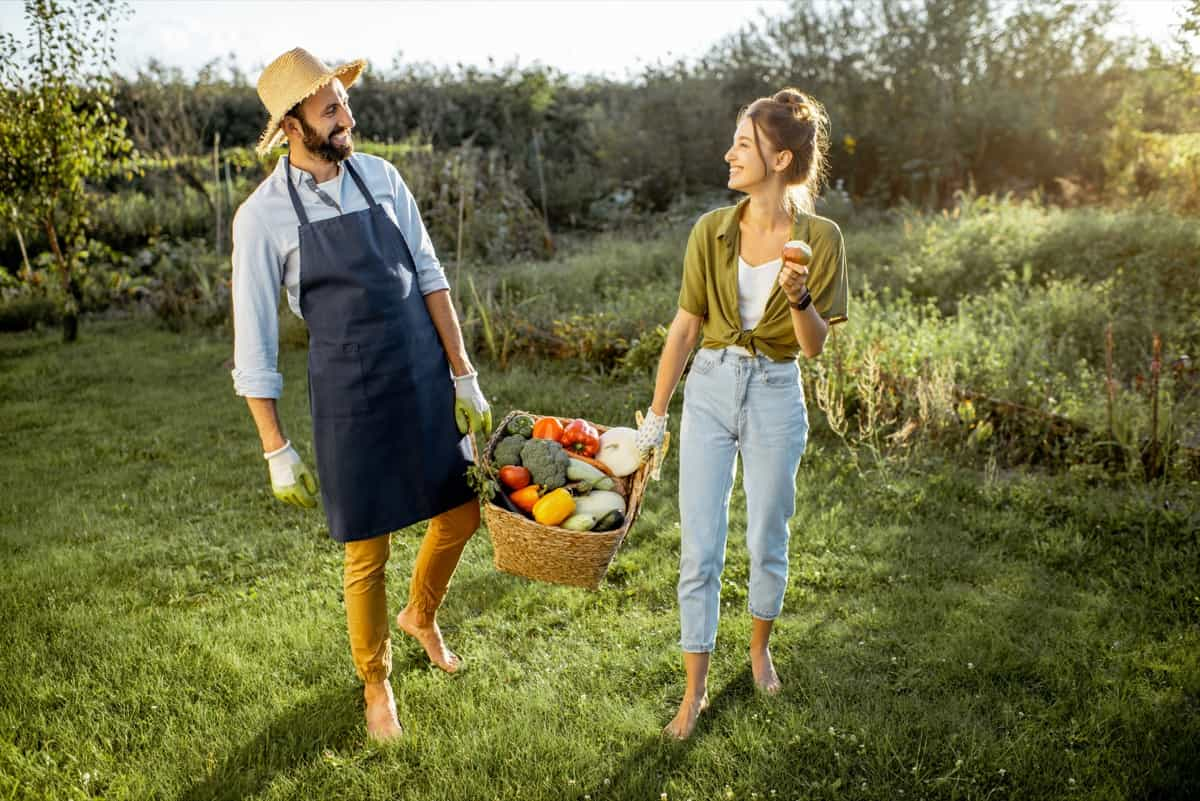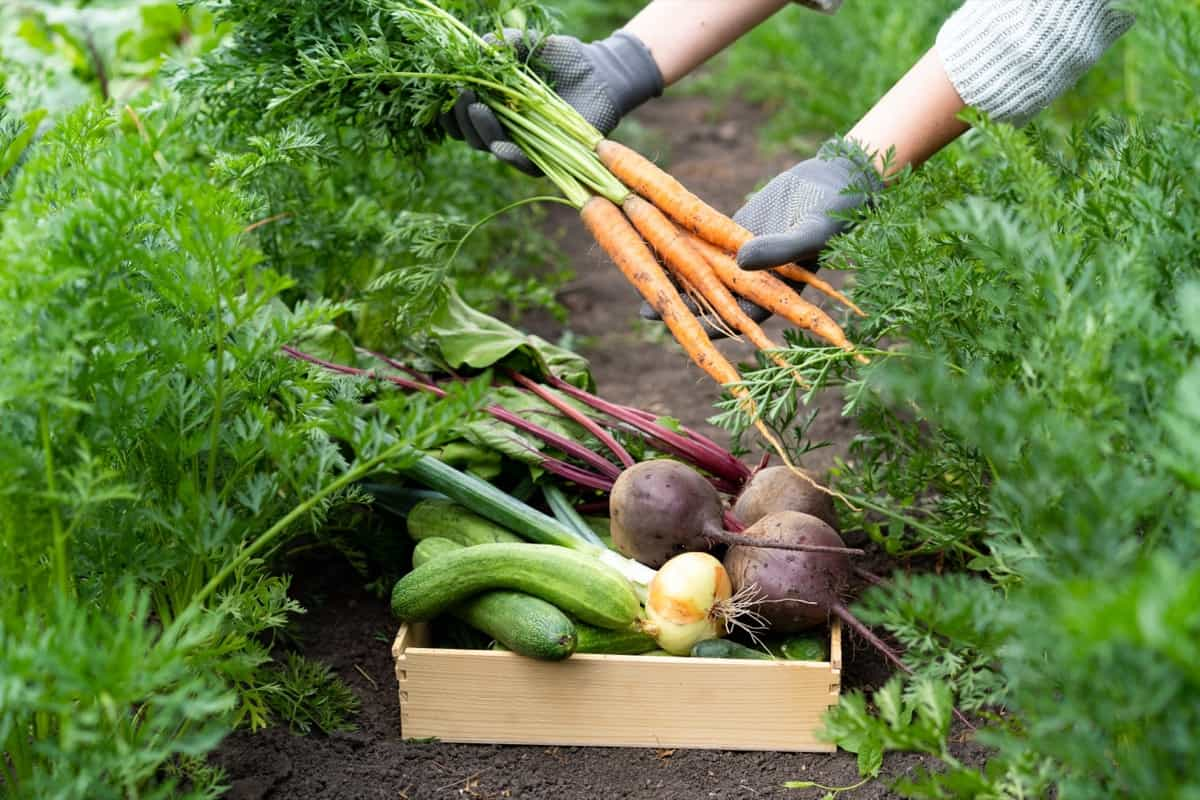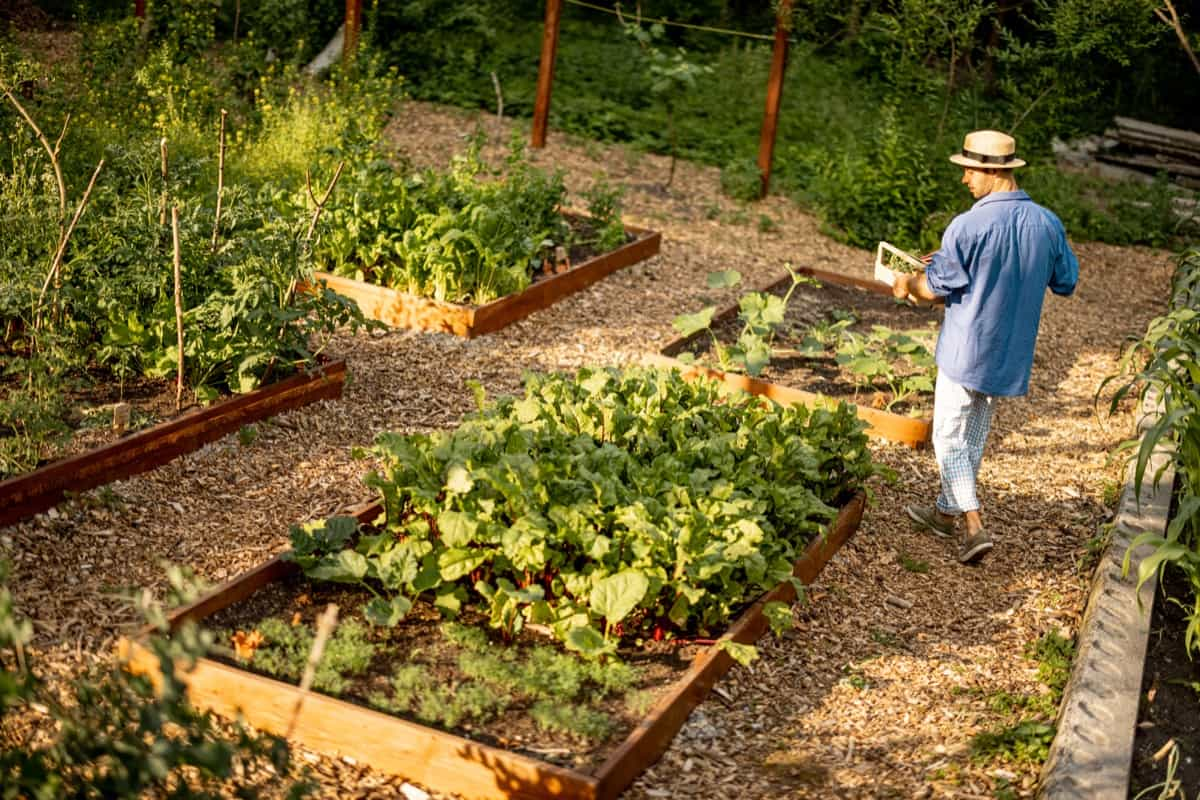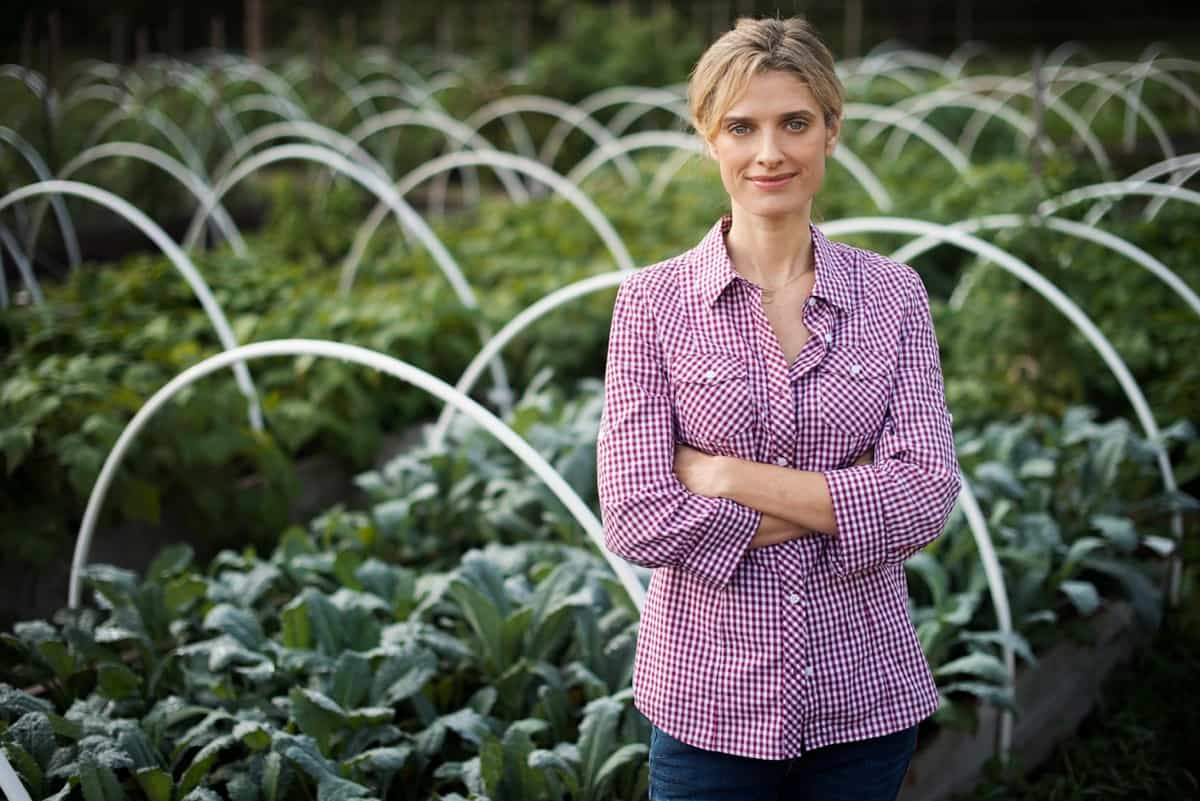Vegetable gardening in Illinois provides a rewarding opportunity for those looking to grow their food. The state offers varying conditions across its regions, from the urban centers of Chicago to the northern agricultural areas. Whether you’re inquiring about the best vegetables to grow in northern Illinois or what to plant in July in Illinois, this guide covers you.

In particular, easy vegetables to grow in Illinois are abundant, and we’ll dive deep into this subject to ensure that both beginners and experienced gardeners find their fit. The essence is to understand the seasonal changes, so whether you’re focusing on the best vegetables to grow in Chicago or elsewhere in the state, you’re well-prepared.
Best Vegetables to Grow in Illinois for Winter: Tips and Recommendations
Winter in Illinois can be harsh, but some vegetables thrive during this cold season. Garlic and onions are top contenders. They require a cold period to bulb correctly and can be planted in the fall for a summer harvest. Spinach is another crop that can brave the Illinois winter, and its leaves can be harvested in early spring. Kale, a cold-hardy green, is also an excellent choice for winter planting, producing fresh leaves even under a blanket of snow. Lastly, broad beans and peas can be sown in late winter to get a head start for spring harvesting.
Easy-to-grow Vegetables for Summer Planting in Illinois: a Planting Guide
Summer in Illinois brings warmth, making it an ideal time for growing many vegetables. Tomatoes, bell peppers, and zucchinis are the easiest crops to grow in Illinois during summer. These vegetables love the sun and are relatively easy to manage. Cucumbers, often used for salads or pickling, can be sown directly into the ground in late spring and will produce abundantly in summer. Furthermore, green beans are not only easy to grow but also provide high yields in a short amount of time.
Spring Vegetable Planting Guide for Illinois: Top Choices for a Bountiful Harvest
Spring is a season of renewal and is an excellent time for planting a wide range of vegetables in Illinois. Carrots, beets, and radishes are root vegetables that can be started early in spring, promising a tasty harvest. Lettuce and other leafy greens like Swiss chard and arugula thrive in the cooler temperatures of spring. Broccoli and cauliflower are suitable for spring planting, as they prefer cooler temperatures to develop heads. Additionally, potatoes can be planted in early spring, ensuring a plentiful yield come summertime.
Cold-hardy Vegetables for Illinois Winters: Extending the Growing Season
Maximize your harvest by extending the growing season into the cold winter. Brussels sprouts and leeks are excellent choices besides the spinach above, kale, and broad beans. Brussels sprouts especially become sweeter after a frost. Turnips and parsnips can be sown in late summer and left in the ground throughout the winter, harvested as needed, offering fresh produce even during the cold months.
In case you missed it: How to Start Pig/Hog/Swine Farming in Illinois: A Step-By-Step Production Guide

Heat-tolerant Vegetables for Illinois Summers: Thriving in Hot Weather
Illinois summers can be sweltering, but some vegetables are naturally equipped to thrive. Sweet potatoes thrive in warm weather and can be harvested during the late summer or early autumn. Okra, a staple in many southern dishes, grows well in the Illinois heat, producing pods throughout the summer. Eggplants are another heat-loving vegetable, with their purple, shiny fruits being a summer favorite. Peppers, from bell to hot varieties, flourish in hot temperatures and are a staple in many summer gardens.
Fast-growing Vegetables for Quick Results in Illinois Gardens
For gardeners eager to see quick results, radishes are the answer. They can be harvested in as little as three weeks from planting. Spinach and arugula are other fast growers, ready for picking in a month or so. Bush beans and peas are also relatively quick to produce, providing fresh pods within 50-60 days from planting. These choices are especially handy for those who might have started their gardening journey a tad late in the season.
Low-maintenance Vegetables for Busy Gardeners in Illinois
For those who don’t have the luxury of time, some vegetables require minimal attention. Potatoes can be left to their own devices until harvest time. Similarly, onions, when given adequate space, are mostly hands-off. Zucchinis, though prolific, are also low-maintenance, only needing regular harvesting to keep producing. Pumpkins are another easy-to-grow vegetable; plant them and watch them sprawl and produce fruits without much intervention.
Disease-resistant Vegetables for Successful Growing in Illinois
The threat of disease is a concern for many gardeners. Thankfully, several vegetables are naturally resistant. Tomato varieties labeled “VFN resistant” are less susceptible to common diseases. Some cucumber varieties are bred to be resistant to powdery mildew. Beans, when properly spaced, can avoid many common ailments. Rotating crops yearly also contributes to disease prevention, ensuring the soil isn’t depleted and reducing the risk of soil-borne illnesses.
In case you missed it: How to Start Corn Farming in Illinois: A Step-by-Step Maize Production Guide for Planting to Harvest

Nutrient-dense Vegetables to Grow in Illinois: Enhancing Your Diet With Homegrown Produce
Growing your food has the added advantage of nutrient-rich produce. Leafy greens like kale, Swiss chard, and spinach contain vitamins and minerals. Broccoli and Brussels sprouts, both cruciferous vegetables, are known for their cancer-fighting properties. Beets, rich in antioxidants, can be eaten raw or cooked, and their greens are equally nutritious. Carrots, loaded with beta-carotene, are a staple in many gardens, offering nutritional benefits and versatility in dishes.
Soil Preparation and Fertilization in Illinois: Building a Strong Foundation
The foundation of every successful garden is its soil. Illinois gardeners should prioritize soil testing to understand its composition and pH levels. The findings highlight the significance of enhancing soil with organic substances such as compost or aged manure. This will improve its structure, making it more hospitable for plant roots and increasing its nutrient content. Regularly adding organic matter can enhance moisture retention in sandy soils and improve drainage in clayey soils. Moreover, a well-balanced organic or granulated fertilizer can provide additional nutrients for optimum vegetable growth.
Integrated Pest Management (IPM) in Illinois: Protecting Your Vegetable Garden Naturally
Pests can be a significant concern for any gardener. In Illinois, one might encounter a variety of insects, from aphids to Japanese beetles. Using Integrated Pest Management (IPM) can yield positive results. This means observing the garden regularly, identifying pests early, and using biological, cultural, physical, and chemical methods to manage them.
In case you missed it: How to Start Soybean Farming in Illinois: A Step-by-Step Production Guide for Planting to Harvest

Introducing beneficial insects like ladybugs and praying mantises can keep pest populations in check. Companion planting involves growing certain plants together to benefit each other and also serves as a natural pest deterrent. For instance, planting marigolds around tomatoes can help keep nematodes at bay.
Conclusion
Illinois offers a diverse range of vegetables suitable for its varied climates, ensuring that gardeners, whether in the urban landscapes of Chicago or the agricultural hubs in the north, have an abundance of choices all year round.
Easy and Best Vegetables to Grow in Illinois
| FAQ | Answer |
| What vegetables are easiest to grow in Illinois? | Tomatoes, peppers, lettuce, and green beans are among the easiest. |
| When is the best time to plant tomatoes in Illinois? | After the last frost in spring, usually late April to early May. |
| Can I grow carrots in Illinois, and how? | Yes, plant carrot seeds in spring or late summer for a fall harvest. |
| Are there winter vegetables that can grow in Illinois? | Kale, spinach, and garlic can overwinter for early spring harvest. |
| What summer vegetables thrive in Illinois? | Sweet corn, zucchini, and cucumbers do well in Illinois summers. |
| How to ensure a successful lettuce crop in Illinois? | It is advised to plant in early spring or late summer; lettuce prefers cool weather. |
| Can I grow sweet potatoes in Illinois? | Yes, plant slips after the danger of frost has passed, in warm soil. |
| What’s the best way to grow peppers in Illinois? | It is advised to start seeds indoors and transplant after the last frost when soil warms up. |
| How can I extend my growing season in Illinois? | It is advised to use cold frames, row covers, or greenhouses to protect plants. |
| What are the best herbs to grow alongside vegetables in Illinois? | Basil, cilantro, and dill are easy to grow and beneficial for vegetables. |
| How to prepare soil for spring vegetable planting in Illinois? | It is advised to amend with compost and ensure well-draining soil before planting. |
| Can I grow Brussels sprouts successfully in Illinois? | Yes, plant in early summer for a fall harvest; they prefer cooler temperatures. |
| What is the key to growing juicy tomatoes in Illinois? | Consistent watering, full sun, and staking for support. |
| How to control pests in my Illinois vegetable garden? | It is advised to use organic methods like neem oil, diatomaceous earth, and companion planting. |
| When should I plant garlic in Illinois for a summer harvest? | It is advised to plant garlic cloves in the fall, around October, for a summer harvest. |
| Can I grow cucumbers in containers in Illinois? | Yes, use a large container and trellis for support; ensure full sun. |
| What spring vegetables should I start indoors in Illinois? | It is advised to start tomatoes, peppers, and eggplants indoors 6-8 weeks before last frost. |
| How can I grow spinach successfully in Illinois? | It is advised to plant early in spring or in fall for a cooler growing environment. |
| Are there any heat-tolerant lettuce varieties for Illinois summers? | You should look for heat-resistant varieties like ‘Jericho’ or ‘Summercrisp’. |
| How to ensure a good crop of green beans in Illinois? | It is advised to plant in full sun after the last frost and keep soil consistently moist. |
| Can I grow onions in Illinois, and when? | Yes, plant onion sets in early spring as soon as the soil is workable. |
| What vegetables can I plant for a fall harvest in Illinois? | Plant kale, broccoli, and radishes in late summer for a fall harvest. |
| How to protect my vegetable garden from Illinois winter? | It is advised to mulch heavily and consider using cold frames or row covers for protection. |
| What soil amendments are best for vegetable gardens in Illinois? | Compost, aged manure, and organic fertilizers enrich soil nutrition. |
| Can I grow beets in Illinois, and how? | Yes, plant beet seeds in spring or late summer for dual-season harvests. |
| How to water vegetables effectively in Illinois summers? | It is advised to water deeply in the morning to reduce evaporation and prevent disease. |
| What are the best companion plants for tomatoes in Illinois? | Basil, marigolds, and carrots can deter pests and improve growth. |
| How to grow zucchini in Illinois? | It is advised to plant in full sun after the last frost in well-draining soil. |
| Can I grow broccoli in Illinois, and when? | Yes, plant in early spring or late summer for a fall harvest. |
| What are some pest-resistant vegetables to grow in Illinois? | Onions, garlic, and marigolds help deter pests in the vegetable garden. |
| How to grow eggplants in Illinois? | It is advised to start indoors and transplant after all frost danger has passed into warm soil. |
| What fertilizers are best for vegetable gardens in Illinois? | It is advised to use balanced organic fertilizers and amend soil with compost. |
| Can I grow radishes in Illinois, and when? | Yes, plant radish seeds in spring and fall for quick harvests. |
| How to manage diseases in Illinois vegetable gardens? | It is advised to rotate crops, avoid overhead watering, and remove affected plants. |
| What vegetables are best for continuous harvest in Illinois? | Leaf lettuce, spinach, and radishes can be planted in intervals. |
| Can I grow peas in Illinois, and when? | It is advised to plant peas as soon as the soil can be worked in spring for early summer harvest. |
| How to choose vegetable varieties for Illinois weather? | You should look for varieties suited to Midwest climates and resistant to local pests. |
| What are the best strategies for organic gardening in Illinois? | You can incorporate compost, use organic mulches, and practice crop rotation. |
| Can I grow Swiss chard in Illinois, and how? | Yes, plant in spring for summer harvests; chard tolerates light shade. |
| How to prepare my vegetable garden for winter in Illinois? | You should clean up plant debris, mulch heavily, and consider planting cover crops. |
| What are the best vegetables for a beginner gardener in Illinois? | Radishes, lettuce, and green beans are forgiving for beginners. |
| How to maximize space in my Illinois vegetable garden? | It is advised to use vertical gardening for vining plants and interplant compatible species. |
| Can I grow cauliflower in Illinois, and when? | Yes, plant in early spring for a fall harvest; it prefers cool temperatures. |
| How to deal with clay soil in my Illinois vegetable garden? | It is advised to amend with organic matter to improve drainage and soil structure. |
| What are the best vegetables for Illinois shady gardens? | Leafy greens, such as spinach and lettuce, can tolerate partial shade. |
| How can I grow organic tomatoes in Illinois? | It is advised to use compost for fertilizer, mulch to retain moisture, and practice crop rotation. |
| Can I grow asparagus in Illinois, and how? | Yes, plant crowns in early spring in a permanent location; it’s a perennial. |
| What’s the best way to grow potatoes in Illinois? | It is advised to plant seed potatoes in early spring in well-drained soil and hill soil around plants. |
| How to prevent my vegetables from bolting in the Illinois heat? | It is advised to choose bolt-resistant varieties and provide shade during peak heat. |
| Can I grow pumpkins in Illinois, and when? | Yes, plant seeds directly in the ground after the last frost for fall harvests. |
| What cover crops are beneficial for Illinois vegetable gardens? | Clover, rye, and vetch improve soil health and prevent erosion over winter. |
| How to grow healthy cucumbers in Illinois? | You should provide plenty of sun, consistent moisture, and support for climbing. |
- Feed Your Flock for Less: Top 10 Tips to Save on Chicken Feed
- Ultimate Guide to Ossabaw Island Hog: Breeding, Raising, Diet, and Care
- Hatching Answers: The Top 10 Reasons Your Chickens Aren’t Laying Eggs
- Eggs and Economics: Breaking Down the Cost of Raising Backyard Chickens
- Defend Your Greens: Proven Methods to Keep Iguanas Out of Your Garden
- Ultimate Guide to Cinnamon Queen Chicken: A Comprehensive Guide for Beginners
- Ultimate Guide to California Tan Chicken: Breeding, Raising, Diet, Egg-Production and Care
- Ultimate Guide to Marsh Daisy Chicken: Breeding, Raising, Diet, and Care
- 10 Types of Chicken Farming Businesses You Can Start for Profits